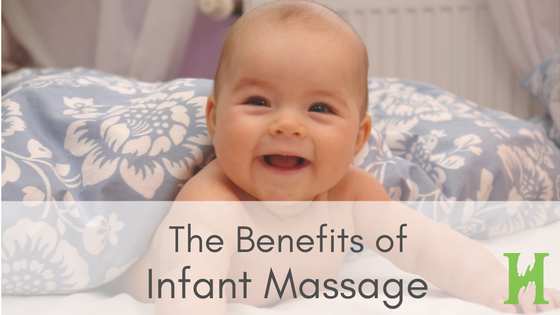UPDATED JULY 2020
I have been doing infant massage in the NICU (and with my own kids) for over 15 years and feel it is one of the most important activities I teach to parents while their babies are in the NICU.
The skin is the largest organ of the body with thousands of nerve cells, blood vessels and sweat glands. The skin is in the embryonic phase of baby’s development from one of the layers of the brain. This connectedness of the mind-body starts around the 3-4th week of embryo development. The outer layer (there are three total) develops into the skin, brain, and the nervous system. This connection between the skin and nervous system has such profound effects on the infant.
Does your baby knead a massage?
Research has produced so much about touch and the positive effects of touch. Human touch helps infants with weight gain, development, bone growth, muscle coordination, and ability to bond with others.1
There are three positive experiences that a premature infant and caregiver can have while in the NICU: kangaroo care, breastfeeding, and infant massage. Massage contributes to healthy development, but especially helps premature infants with brain growth, weight gain, improved circulation, helps mature the nervous system and improves bonding between parent and baby. Yes, infant massage does reduce infant’s stress levels due to the NICU environment, and the premature infant can learn how to relax.
For mothers who are breastfeeding, massage can actually help stimulate prolactin, the hormone that increases milk production. For fathers, I find teaching them massage is crucial to help them bond with their baby. It also helps fathers to feel comfortable touching and handling their baby. They often feel they will hurt their babies since dad’s hands are usually larger than the mom’s and they are afraid of their child’s fragility.
How to perform infant massage
It’s important to note that parents should only perform infant massage in the NICU with the approval of their baby’s medical team.
The teaching/training of infant massage is a social activity as well as applying massage strokes. It is most important for the parent and child to look at each other (if able to). The premature infant needs to be in a safe and warm environment. If the baby is not able to maintain its temperature, then massage will have to wait. The atmosphere should be without stressors such as bright lights or noise. Sometimes, it is good to utilize a heat lamp over the baby because the NICU temperatures vary and once the baby’s limb, back, or belly is exposed to air, the infant’s temperature could drop to an unsafe temperature.
The parent performing the massage should be relaxed, as the premature baby will be able to sense the tension. When the parent is starting the massage, the touch will be the following: firm, but gentle; slow and steady; rhythmical and contained. The best place to start the massage is on the legs, mainly because it is not as highly sensitive to touch and the baby can tolerate this area the best. From there, using the same strokes, one can either massage the upper extremities or move to the baby’s belly. The strokes on the baby’s belly aren’t usually for relaxation (although some babies do relax with the strokes), but more to produce something—gas or stool. From there, one would massage the back, then face (chest is optional). The whole massage can take from 15-30 minutes, but you must be careful not to stress the premature infant too much.
Signs your baby is stressed
Many parents may be unaware that the “cute” things their baby does may be the way to tell you they are stressed. The biggest and obvious signs are bradycardia (low heart rate) and desaturations (oxygen levels under 85%). Some other signs might be sneezing, excessive yawning, hiccuping, coughing, spitting up, or giving you the “stop sign:” baby’s hand will literally come up towards you and the baby will turn their head away from parent. If parents see any of these signs, the baby is trying to tell them that they have had enough stimulation, either touch or sound, and the baby needs a break.
Benefits of infant massage
I often get asked how long should one massage their child after the baby is discharged from the NICU. What I tell parents is if the baby is benefiting from the massage, to continue to do the massage. If massage was helping the baby’s brain development, especially to the age of 3 years and beyond, would a parent really want to stop massaging their baby? How many adults want massage to be a done deal after a certain pain was gone? Wouldn’t a person want to continue to have the benefits that massage therapy provides?
The endorphins that are released into the body during massage combat the stress hormones (cortisol) already in our system, being in the parasympathetic nervous system (calming) as compared to the sympathetic nervous system (fright or flight). Working in massage with both infants and adults, I can see that babies are mentally more relaxed, positive, have less stress signals, less alarms going off, deeper sleep and better weight gain. I believe that the baby’s mind and soul are truly affected by massage in only positive ways. The parent-child bonding experience is just one example of this. Many parents find it hard to put into words their massage time with their infant. Most say it was just as pleasurable giving the massage to their baby as the baby receiving it. That just makes my heart melt and one of the main reasons why I work with parents. I feel all parents should learn massage for their kids. You can’t put a price on something so valuable to both parent and child.
Did your NICU provide instruction or did you learn it through Early Intervention? Have you found infant massage a positive interaction with your baby?
Sources:
1 Leboyer, F. (1977). Loving Hands. Paris, France: Collins.
 About Tracey Kondrasuk-Brander
About Tracey Kondrasuk-Brander
Tracey Kondrasuk-Brander works part-time as a NICU Occupational Therapist at Wellspan Health. She is also a Licensed Massage Therapist and Early Intervention Occupational Therapist. Tracey has recently launched a new on-line consulting website, Early Developmental Therapy Consultants, to help parents of premature infants with questions about developmental concerns and occupational therapy.

